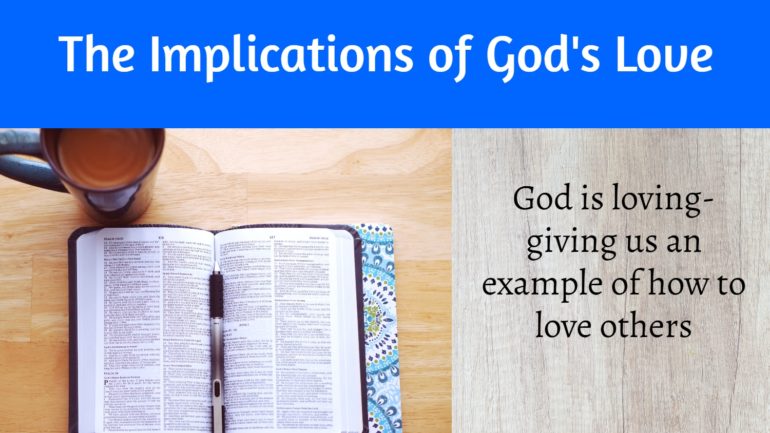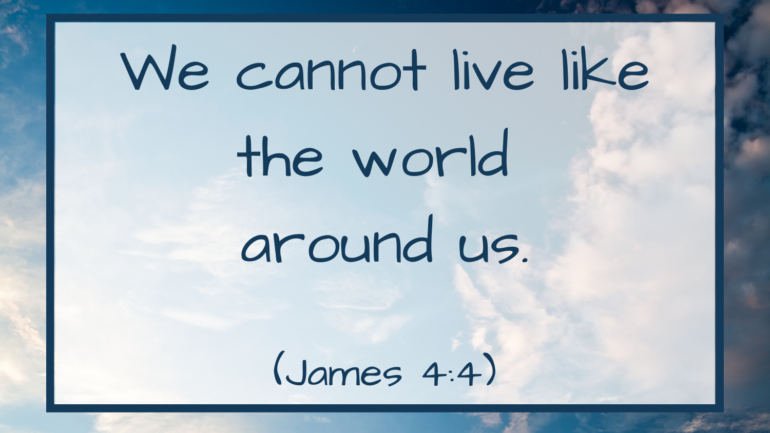God’s love for us is our example of how to love others.
What is love?
When we think about love, our first thought probably goes to a romantic type of love. Our culture seems obsessed with romance. People love romantic movies, love songs, and romance novels. The obsession with romance has even seeped into the church, and it affects the way we describe our relationship to Christ. People talk about falling in love with Jesus. Sometimes it’s even hard to tell the difference between a praise song and secular love song
Many Words for Love
In the English language, we only have one word for love. We use that one word to describe our feelings about a variety of things. We love ice cream. We love puppies. We love our family. We love God. However, that one word doesn’t really reflect the difference in how we feel about these different things. Surely, we love God differently than we love ice cream.
The Greek language recognizes the need to be more precise in describing feeling. Greek actually has four words that are translated into English as “love.” Eros refers to a romantic type of love. That’s the type of love that our society is so focused on. Strangely, enough, that word is never found in the New Testament, even when talking about love between a husband and wife. Now it’s not wrong for a husband and wife to love each other that way, but that is not the type of love that the Bible focuses on.
Another Greek word, storge,describes a parental type of love, but that’s not found in Scripture either. Philia or phileo, as you probably know, is a brotherly type of love, as in Philadelphia, the City of Brotherly Love. That word is used 54 times in the Bible. The Greek word used the most in the Bible for love, though, is agape, which refers to the type of love that God has for us, and the type of love that we should have for God and others. The word agape is used 259 times. This agape love is what we will be discussing tonight.
What is agape?
Agape is not a feeling. It’s a choice.
According to the world, how do you know that you love someone? I enjoy reading Christian romance novels, and they are all very similar in their description of what it’s like to fall in love. You get a tingly feeling in your stomach. You feel nervous around that person. Your heart beats faster and your hands start to sweat. You think about the person all the time and can’t wait to see him again. It’s a very physical and emotional reaction to that person. Even a non-romantic love between family or friends is thought to be emotional. You should have warm, fuzzy feelings about that person and enjoy being around them.
Choosing to Love…
What happens, though, when the feelings change? After a while, you don’t get the tingly feeling anymore. Instead of wanting to be with that person all the time, there are actually days when you can’t stand him and don’t want to be anywhere near him. Instead of only seeing the wonderful things about that person, you’ve become painfully aware of his many faults. What do you do then?
The world would say that you’ve fallen out love, and it is now time to move on and find someone else that makes you feel good inside. What the world doesn’t seem to realize, however, is that love is not about how you feel. Love is actually not about you at all. Love is a verb, an action word. It’s about what you do for other people.
We’re not always going to feel warm and fuzzy toward other people. People will frustrate us, make us mad, disappoint us, use us. It’s in those moments that we have a choice to make. Am I going to love this person or not?
…Because God Chose to Love
That’s where agape comes in. God loved us and chose us even while we were still sinners. He should have hated us because we had turned against Him, choosing our own way instead of His. We turned our backs on Him. If anyone had the right to not love someone, it would have been God. Yet He made the decision to love His people.
We must also choose to love people, even when we don’t feel like it. We are to love others simply because God tell us to. We’re even commanded to love our enemies (Matt. 5:44), which shows that love is not about feelings, because how can you feel love toward someone who is out to get you? You can’t, but that leads to our next point.
Agape is love in action.
You can’t make yourself feel a certain way, but you can make yourself act a certain way. You can show love to someone, even if you don’t feel love toward that person. It may mean picking up your husband’s dirty socks when he leaves them on the floor again. It may mean being up all night with a sick child, even though you’re exhausted and just want to sleep. It may be helping a neighbor or family member again when you really don’t want to. It may mean praying for those who abuse you, as Matthew says. Love means doing things for other people even when we really don’t want to. Jen Wilkin writes, “We do not wait to feel love; rather we will ourselves to act in love whether we feel it or not.”
The crazy thing is, after a while, our feelings may follow our actions. If we choose to show love to someone, and we pray that God will help us to love that person, then the feelings may come. But we have to remember that it’s not about the feelings, and even if they never come, we still must show love to people.
God’s Example of Love
This idea of love in action is the example that God has set for us. Many times, when we read about the love of God, it’s connected to some action that He took on our behalf. Let’s look at some examples:
- Romans 5:8-God loves us, so He sent Christ to die
- John 3:16-God loves us, so He gave His Son
- Galatians 2:20-Jesus loves us, so He gave Himself for us
- 1 John 4:9-10-God loves us, so He sent Jesus to die for us
Do you notice a common theme in these verses? God’s love was shown by His giving us His Son. That leads to our next point.
Agape is a sacrificial love.
Because of His love for us, God made the ultimate sacrifice. He gave His only Son. According to Charles Spurgeon, “God gave God.” He sacrificed a part of Himself to save us, even when we didn’t deserve it. Jesus showed us the greatest example of love possible by going to the cross and dying in our place. John 15:13 says, “Greater love has no one than this, that someone lay down his life for his friends.”
When we choose to love someone, it may not cost us our life, but it’s going to cost us something. It may cost us time, money or possessions, or energy. We must be willing to give of ourselves for the sake of others. That’s what love is all about, putting the needs of others first, as we read in Philippians 2:3-4, “Do nothing from selfish ambition or conceit, but in humility count others more significant than yourselves. Let each of you look not only to his own interests, but also to the interests of others.”
This does not mean that you have to let people abuse you or take advantage of you. You do not have to condone their sinful or even criminal behavior. Loving someone means doing what is best for that person. Sometimes, that requires tough love. It means walking away and letting them face the consequences of their own behavior. It may mean speaking the truth in love, even when that truth is hard to hear. It may even mean pressing charges against them if they’ve broken the law. However, tough love is still love, which leads to our next point.
Agape is unconditional love.
Human love is limited or conditional. We love those who love us in return. We love people as long as they meet some need for us, or as long as it’s convenient for us. We may only love those that we feel are worthy of our love. When loving someone becomes too difficult, too painful, too inconvenient, then we often walk away.
Aren’t you glad that God’s love is not like that? He loved us way before we ever loved Him, even when we hated Him. He loved us even though He didn’t need a thing from us. He loved us when we were unworthy of His love. We could never earn God’s love, never deserve it, never repay it. Fortunately, we don’t have to. God’s love is totally unconditional. He loves us in spite of ourselves. Martin Luther says, “God did not love us because we’re valuable. We’re valuable because He love us.”
In the same way, we are to show love to everyone, unconditionally, regardless of who they are or where they’re from, regardless of their social status or their educational level or any of those things that we use to determine if a person is worthy our love.
We’re to love the unlovely, the undesirable, the outcasts even, of society, because in God’s eyes, everyone is worthy of love. We are all made in God’s image, and that gives every person an inherent value and dignity that is not dependent on any outside criteria that we might judge them by. We must choose to love everyone because they reflect the image of God.
Agape is a supernatural love.
This type of love may seem like a tall order. How can I continue to love that person when he makes me so mad? How can I give so much of myself to love someone else? How can I love unconditionally after what that person has done to me? The truth is, we can’t! At least, we can’t without God’s help.
This type of love originates with God, because God is love. He is the source of agape love and He is the One who enables us to love others this way. However, Jen Wilkin writes that a deficit in our love for neighbor always points to a deficit in our love for God. She says, “Unless we love God with all of our heart, soul, mind, and strength, we will love ourselves and our neighbors inadequately. Right love of God is what enables right love of self and others.”
Basically, she’s saying that if we don’t love God properly, we won’t love others properly. Our love tends to get out of balance. Often, we love ourselves more than we should, which means that we love God and others less than we should. Have you ever heard that the secret to having joy is found in the word itself…Jesus, others, then you? When you love in that order, suddenly life is back in balance. When you love Jesus the way that you should, then His love flows through you onto others, and suddenly your own needs and desires don’t seem so important anymore. Really, the only way you can love the way should is by allowing God to love people through you.
Implications of God’s Love
God’s love gives us value.
We often try derive our value from the opinion of other people. If people love us, we feel good about ourselves. If no one seems to care about us, we feel worthless. But even if no one on Earth ever loves us, we are still valuable because God loves us.
God’s love cannot be earned.
God’s love for us is unconditional, so we can stop trying to earn it. We can also stop trying to be good enough to keep it. We obey God because we love Him, not to make Him love us. He doesn’t love us more when we obey, and He doesn’t love us less when we sin.
We know God loves us because He made the ultimate sacrifice, giving His Son to die for us.
Sometimes, we may not feel God’s love. Jen Wilkin says, “God’s love is holy and infinite, so all of His actions are loving, even when we don’t perceive them to be. When we can’t see how His actions are loving, the problem is our limited perspective.” So, if you ever doubt that God loves you, remember the Gospel, and remember who God is.
Everyone is valuable and worthy of love because they are made in God’s image.
Therefore, we are to choose love everyone sacrificially and unconditionally. When that seems too hard, remember that only when you love God with all that you are, can you then love others the way you’re supposed to.
The information in this post was based on the following resources:
In His Image: 10 Ways God Calls Us to Reflect His Character by Jen Wilkin
The Attributes of God DVD by Steven Lawson
Unless otherwise noted, Scripture quotations are from The ESV® Bible (The Holy Bible, English Standard Version®), copyright © 2001 by Crossway, a publishing ministry of Good News Publishers. Used by permission. All rights reserved.






Seeking God's Face: Discovering the God of the Bible - She Lives Worthy %
[…] The Implications of God’s Love (blog post) […]